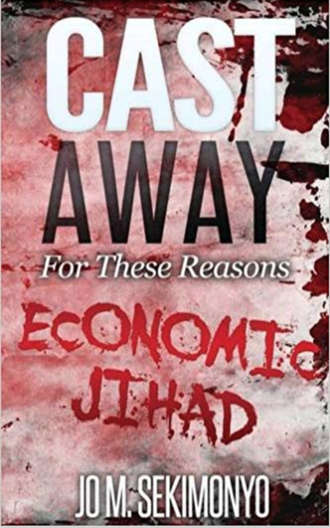
Полная версия
Cast Away : For These Reasons
From that experience it has become my life ambition to hunt down the answer to those questions of what my solutions would be. In my search, I determined that those remedies ought not be relevant only to the United States of America, the Mongolian People's Republic, or the Democratic Republic of the Congo but have to be applicable and relevant to any fatherland or motherland. The theos of society in general would have to change and given a permanent solution. The status quo of belief here today and gone tomorrow regarding the social compact had to stabilize into one that was permanent, fair, equal, right (as versus wrong) and just.
The solution first and foremost is not found in the idiotic catch phrases of one political party, or system, or another. It is found within the home of each citizen of every nation, indeed, the world. Looking at society as the makeup of individual citizens one must ask: âwhat is right, good and fair for that one person, one couple, one family.â It can hardly be found in the ever-shifting sands of political systems, or even religious systems, theory or thought. It can only be found in that which is most important to the individual and his or her family, the ability to survive. The ability to survive is based upon economics.
I have left to the class of sloppy cerebral sloths of lumpen-intellectuals and politicians to tiptoe around pressing issues. Instead, you, the reader, and I will be swimming against the current torrent. Chapter one through six is exhibits of the case against the current social, commerce and trade, and political status quo - Capitalism. If I see you on the other side of chapter seven, please hold my hand tightly from chapter eight through ten where I wreck from the subliminal fundamentals of Capitalism. Take your time to digest chapter eleven and get yourself prepared for a big slap in the face. On the closing argument, chapter twelve follows through James Tobin's recommendation: "Good papers in economics contain surprises and stimulate further work."
What else? I made this book easier to read than fat torching. Each chapter debuts with quotes giving you a clue of what to expect and have interjected "interludes" between batches to awaken young readers with short attention spans, and to add a zest of a novelty for the literary enthusiasts. I shall confess to folks who expect colorful charts and numbers and to economists addicted to ketamine (mathematical models), I am sincerely sorry that I have let you down. One thing is for sure, at no time I did pull my punches. Oh yeah, and I did not waste my energy on the discourse of twentieth-century economists. You do not need to sample manure to confirm it is manure; the stench of falsehoods is sufficient to discern it as such.
The idea of writing a book is equated with getting butt naked in front of a large audience. I never had a problem doing that. But my constant inner battles through this experience consisted of synchronizing my heart with my mind. I had to overcome the temptation of being guided solely by either passion or vision. Both intensity and accuracy are essential in this enterprise to birth out a new concept. Remember, in life, passion without vision is a waste of energy, and vision without passion is a dead-end.
One brilliant soul, Swami Vivekananda, often chanted so eloquently: "Take up one idea. Make that one idea your life - think of it, dream of it, live on that idea. Let the brain, muscles, nerves, every part of your body, be full of that idea, and just leave every other idea alone. This is the way to success."
The world might one day know the magnitude of sacrifices I made to cultivate this idea I genuinely care about, a solution to the severe global social, commerce and trade, and political injustice. The anchor of this book would be in vain without providing a full-bodied alternative to Capitalism, a remedy that might justly mend the social democrat economist mind. It is about time that we bring back dialogic analysis without channeling old economic demons. Above all, I hope this document will stimulate a number of people to discuss and further the solution proposed in this book or creatively to give life to another path away from Capitalism. And may William Godwin rest, at last, in peace.
2
Kamikaze

"I am the wisest man alive, for I know one thing, and that is I know nothing."â Socrates
A few years back, while I was walking down a cluttered and depressing street of Addis Ababa in Ethiopia, the sight of a frail teenage mother and a sleeping filthy child wrapped on her back with a little piece of cloth instantly transported my mind back to my intellectual "Waterloo" defeat at Kenyatta International Airport in Nairobi. It was then that it hit me - Eureka! Still, on that day, I was far from years of an investigative roller coaster ride to articulate a cure for social classes' decomposition tormenting every society.
After that, I invested time, money, and energy to get a real sense of the problems people face around the globe. To that end, Tara and I traveled as much as we could afford, read abundantly, and glued ourselves for hours to the television screen watching documentaries. One of my crusades took us across the Sub-Saharan and Eastern region of Africa (SSEA), and we were astonished by the region's many challenges, which transcend geographical boundaries. The overriding feature of the SSEA is an exotic mamba with two heads: corruption and repression. You can blame the region's dysfunctional governments, which are essentially being used as an apparatus to consolidate power and wealth within a few ruling families. In short, public services across this region are a disastrous joke.
There are many fingers to be pointed at the SSEA's organized chaos; these abysmal management practices are either of the SSEA nations' design or imposed on them from the outside, as I suspect, to impede both internal and regional development. While touring different cities in the western hemisphere, I noted the same gangrene as I find in African or Latin American countries. Seriously, you would think that the state of Illinois was in Nigeria when the former Governor Rod Blagojevich was sent behind bars for trying to sell the forty-fourth President of United States, Barack Obama, his former senatorial seat. The BRIC reported scandals are of epic proportion. I am not a big fan of fútbol, but I expected Brazilian contractors to make a mockery of the 2014 soccer World Cup, with overpriced stadiums and bridges that crumbled before and during the sacred festivity. What to say about the scandal in China's southern city of Hengyang that triggered the resignation of almost the entire city's People's Congress leaders? The prevalence of resource mismanagement and leaders' self-indulgence have resulted in globally unprecedented levels of financial waste.
"A casual stroll through the lunatic asylum shows that faith doesn't prove anything."â Wilhelm Nietzsche
On my tour du poor monde, I met dedicated westerner students who were on or getting ready for, mission trips to spice up their resumes or to boost up their chances to be admitted in a prestigious higher learning institution. I have caught myself glazing over by beautiful pictures of A-listed celebrities, or a charity spokesperson, who profoundly wanted to "save the people" (though sometimes the animals more than the people). The madness is nothing compared to graduate classes on public engagement or economic development that I have taken on the better side of the globe, where I found naïve characters who see themselves as miracle laborers and benefactors of third world countries. As talented as these individuals might be, the flaws in their conceptual approach is the bigoted view of less developed nations' challenges and needs. They base their models of development on the deep-rooted passion for Capitalism and sense of cultural superiority. This mindset reminded me of the aphorism "if the only tool you have is a hammer, everything starts to look like a nail."
What is more hazardous to poor nations than smart ass westerners? Immigrants from god forgotten countries; self-enslaved and adoring conformists, with the little access to modern amenities and western taste that they have acquired, who dare vocalize that living on a dollar a day is "just how it is" in their home countries. I have found a high concentration of these stupid individuals in England, where Engel's account of the living conditions only a century ago sent chills down my spine.
In the United States, which was not too long ago a shit hole with a putrid stench of racism, sexism, and bigotry (the stench still lingers in the air). Lastly, if you are one of those monkeys from a repressive authoritarian regime which is walking down lit up streets in the west, delighted from the addictive sense of protection and freedom and yet has a firm conviction that developing nations need a "strong man" for peace and development. Before you read the rest of the book, repent.
It has to be noted that, throughout time, a dominant society has always knighted itself the prestigious "exceptionalism" status. I would applaud this gut and bravura if their economists took on the leadership responsibilities of dissecting the world around accurately and, accordingly, prescribe effective interventions that would lift us all up.
The intent of both socialist and capitalist nations has been to globalize its influence and inclusive reach. Socialism in the political militaristic fashion, while Capitalism choose to do it through business hegemony. Globalization has no more benefitted the socialist enterprise than the capitalist endeavor. For the 2014 Sochi Winter Olympics neighborhoods received their first sewer systems and running water, 100 years after the great socialist victory in St. Petersburg. In shocking similarity large areas of capitalist nations in the western hemispheres both north and south have large populations in not so dissimilar situation. This while St. Petersburg and Moscow enjoy gold encrusted bathroom fixtures to be rivaled only by those in Paris, London, New York and Los Angeles.
While socialist athletes enjoy all the benefits of stardom and wealth their western counter parts do, the western athletes rising up from shoeless beginnings bed themselves in palaces that pale those of African, Asian, and Caribbean national palaces.
What do we have right now? A total fuming global mess where Cost-effectiveness and Gross Domestic Product (an insane way to gauge citizens' life betterment) are at the center of leading initiatives. I have to underline the overused excuse, "globalization," since it has added elements of scope and speed into the mix. What to say about humankind when, time and time again, leading nations turn a blind eye to the imposition of inhumane practices, which was slavery in past centuries and now Self-deprecating is added to the load, as long as it benefits them?
I get angry when westerners are surprised that development programs, which are shoved down the throats of problematic countries, do not lead to prophesied outcomes. I become angrier when solutions for inhabitants' needs can be addressed in an integrated way. Instead, from their desks in Washington, DC, economic druids clean the data up and develop simplified models, which abstract from the complexity of observable reality.
Time and time again, critical studies conducted by no other than the International Monetary Fund (IMF) and the World Bank insiders have poured out evidence of the leading international financial institutions' programs effectiveness1. These guilty consciences decry how a country economically faint is treated as a coma, rushed into an international organization emergency room, locked into unplugged financial incubators, and knocked out by an addictive overdose of aid, is then molested and gangbanged by frantic necrophiliacs and is used as a testing ground for irrational experimental reform programs. God forbid, a vegetated nation shows any sign of life after these unnecessary open-heart surgeries as what the Argentine Republic did; it will be at the mercy of ferocious vultures who would try to pull its eyeballs and intestines out.
The Failed State Solutions of the UN
What is the standard antidote injected into a nation once deemed as a "failed state?" Let's look at Haiti after Hurricane Sandy blasted through this voodoo nation that was already socio-politico-economically wobbling for a century. First, it was quarantined and put under the supervision of spooky eyes of international trusteeship. After what powerful nations imposed via douceur (democratic elections) to millions of illiterates, a charismatic buffoon whose brightest idea was to organize carnival celebrations all over the smaller portion of the island of Hispaniola, while serious decisions were taken solely by the World Bank and International Monetary Fund emissaries. The social, commerce and trade, and political crimes committed in Haiti are far from being an isolated case; international assistance funds have been used by predator nations to extract that sort of concessions from the crippled nations, which often are not willing to offer in healthy times.
What we have seen in Haiti and in other black holes where those same approaches were taken is that remedies produced a worse net result than the problem itself ever did. Primarily because these nations' kleptomaniacs and technical "partners" often implement contradictory dogmas and reforms that cause poor countries to fall further behind. I should not be the first one to tell you that John Maynard Keynes and Harry Dexter White offsprings and other international financial institutions act at the whim of their backers and backers' backers' interests. This, in turn, leads to another round of despicable resource waste and mismanagement. If you are craving to get a sense of the magnitude of this mess, please take a tour of Cite' Jalousie, Port au Prince, Haiti, and compare it to villas rented by United Nations "peacemakers" a few miles away.
It matters little, socialism, or capitalism, greed is greed, avarice is contagious with power and the political pathway to the ability to have it makes little difference. The end result is the glorification of heroesâ feet be they in the athletic shoes of Nike or the Wingtips of a politician. The result is the continued suffering under a disparate economic system that consistently shells out to the privileged few and discriminates against the disadvantaged many. What to say about humankind when, time and time again, national leaders turn a blind eye to the continuance of inhumane practices. Slavery still exists. It isnât as open, there are no ships full of black or brown retched incarcerated humanity, now days they are transported in containers aboard ships freely traveling the high seas finding homes in the most fashionable cities of the world.
"I preached as never sure to preach again, and as a dying man to dying men."â Richard Baxter
Nowadays, economists claim that a theory can't be developed except in a purely numb way; any phenomenon that can't be reconstructed in a mathematical model is deemed illogical and trashed. If in a sense, nothing is explained unless everything is stated in a mind-bending equation frame, this book is read as a suicidal letter. I am not depressed enough either to jump in front of a subway train or to make a journey to a Buddhist monk temple. I have to thank the classical and prodigal political economists who were not inclined to this constraint and who aesthetically birthed essential principles and, unfortunately in most cases, robust diabolic treatises.
In third world countries, the contrast between the misery and despair of the many and the level of opulence and waste of the few is not a complex abstract, but rather an observable reality on an insane scale amounting to a moral abomination.
Western revered revisionists under the umbrella of international organizations such as UNDP (United Nations Development Program) are suggesting that third world countries nightmares have nothing to do with colonization. The pathetic excuse is held as the truth even when we see post-colonial social layers mirroring the caste system inherited from colonizationâs ruthless exploitive social construct. Little has it done, other than imposing a maniac head of state, to help the marginalized evade a bleak future. Social, commerce and trade, and political anthropophagy (Capitalism) is an exogenous concept proven not fitting for developing countries' realities and potentials.
In the global Capitalism arena, a nationâs ability to race against others of at least the same size predetermines its prospect for growth and development. The Republic of Burundi and the Kingdom of Belgium, two countries of roughly the same size and population, cannot be further apart economically. Burundiâs GDP is half of one percent that of Belgium. Other than racking debt higher than the tiny Kingdomâs GDP, how else did Belgium achieve this prowess?
The historians tell the story of Belgiumâs comparative advantage over Burundi beginning in the 19th century. Belgiumâs King Leopold II2 applied the well-traveled path of, âif you donât have resources, go grab some.â Through this, just like The Netherlands, Britain, France, Italy and Germany they were able to amass personal and national wealth. Colonization was not a self-defeating drain on the domestic economy. Quite the opposite.
While Germans were decimating Burundiâs socio-cultural structures, from 1887 to 1965, King Leopold II of Belgium, and subsequently Belgium as a nation, was quietly plundering the natural resources from a territory eighty times its size, known today as the Democratic Republic of Congo. After World War II, Burundi was wrenched from Germanyâs grip and given to Belgium by the League of Nations for enduring the temporary hardships of war by their big neighbor.
Developing countries are not the sole sources of evidence of the global malfeasance by politicos and their economist stooges. On the one hand, centralized economies have failed by imposing a uniform basket of needs for the ninety-nine percent of the population at the bottom. The defunct Soviet Union implemented Communism by plundering the wealth of the ruling class and then ate the middle class when the wealthy were extinguished. The intelligentsia filled Gulags who knew how to run a nation and economy no matter how poorly, or who quickly deserted the nation of their birth for France, England, Germany and America. This left the Soviet Union with management at every level with no knowledge of how to run a nation let alone a war-torn bankrupt economy.
Whereas on the other hand, the free market is failing us with a morally bankrupt rules of survival of the fittest, catering to the new investor classes of fractional class elite. The defunct Soviet Union implemented Communism correctly until it hit a wall, literally. Whereas on the other hand, the free market is failing us with an unethical rule of the survival of the fittest, catering to a small group of the one percent at the top. The only time, in recent memories, The United States Congress came together in bipartisan fashion was to bail out numerous "too big to fail" U.S. banks and insurance companies. In contrast, in 2013, the same Congress slashed billions of dollars from the food stamp program that had kept a chunk of The United States population noses above the poverty level3.
When you pay attention to the global financial transactionsâ postcard, you should be able to see how the Capitalism model has confined lucrative international financial flows within the same economies. Other countries are reduced to mere providers of raw material and cheaper labor. However, the fat lady is about to stop singing very soon; she is getting too plump to stand on her feet. In 2010, General Motors shut down their plant in Antwerp, Belgium, because of the excess capacity in the European car industry. Subsequently, other plants across different industries in Europe and North America have since closed their doors.
"Koketsu ni irazunba koji wo ezu."â Japanese Wisdom
Although by respective economic doctrine, the Republic of Cuba and England are recklessly doing right. At the assessment of the two existing economic lines of attacks (poverty, pollution, war, etc.) suggests to our sense of humanity that neither approaches are the right thing to do. I had a glimmer of hope when the former Soviet Union and China decided to go cold turkey, breaking out from the communist penitentiary institution, until they ran straight into the psychiatric Capitalism facility, which is a pure form of insanity!
Currently, the world lacks full-bodied alternatives and, after multiple frantic financial crises, acknowledging Capitalism's barbarism and flaws should not be a mortal sin. In the light of recurrent facts, financial cataclysms' austerity and spending have shown not to be sustainable solutions, but rather a lampooning of the struggling class. I allow myself here to say in the most simplistic way, new markets need to be promoted to rejuvenate the global economic system, but in doing so, new trends need to be developed to avoid the final cataclysm. This change requires applying the appropriate social, commerce and trade, and political form that will not only move "poor" countries into the international trade system, as to say from exploited bystanders to active producers and buyers but also break current markets' affairs from the old order and the New World Order.
Creative as humans are, I used to wait on the side for a superwoman to save us all. Then I learned that in 1945 when American and British battleships and aircraft carriers were getting close to the Japanese mainland, ordinary young people were asked to make the ultimate sacrifice to save the empire of the rising sun - their lives. The pitch of victimhood built on the atomic attacks in Hiroshima and Nagasaki romanticized these young men's fearlessness. I took an offense when called a kamikaze for my attacks on Capitalism only after I learned about the Nanjing Massacre, and women forced into sex slavery for the Japanese military.
Tired of waiting for a whistle that will halt our deliberate destruction, I am not going to bore you with the same crybaby wailing that you have come to associate with critics of Capitalism or social, commerce and trade, and political injustices. To burst your bubble, the solution is neither increasing the minimum wage, give a dog a bone, nor building up tax barracks, Nezumi kozo. These two are nothing more than economic palliative remedies. To your delight or indignation, I am going to expose your few remaining neurons to a new social, commerce and trade, and political form that potentially transposes general notions by propelling the ninety-nine percent to the top and take care of the one percent less fortunate at the bottom. And Caesar, ahem, you the reader, would have to decide my fate!
3
I see poor people

"In a country well governed, poverty is something to be ashamed of. In a country badly governed, wealth is something to be ashamed of."â Confucius
In my view, by far the creepiest social site out there is the one dedicated to M. Night Shyamalan by one of his diehard followers. For an Indian-American to achieve such a high level of success as a screenwriter, film producer, director, and A-listed star of Hollywood without relying on the clichéd dancing and chanting in Bollywood cinematographic format is impressive. I am, myself, a huge fan of his breakthrough and most celebrated movie The Sixth Sense (1999). This movie's box office gross suggests that there are not many homo-sapiens who have not watched it. For the rest of you who were still living in cages around that time, the superb plot is around a boy, Cole, who has the ability to communicate with spirits that don't know they are dead. He seeks the help of a depressed child psychologist, a role superbly played by one of Hollywood's biggest stars at the time, Bruce Willis. The movie's good bumping moment comes when the camera slowly zooms to the boy's face, then-unknown child actor, Haley Joel Osment, and he whispers, "I see dead people," turning the line instantly into one of the most used catchphrases of that time.






